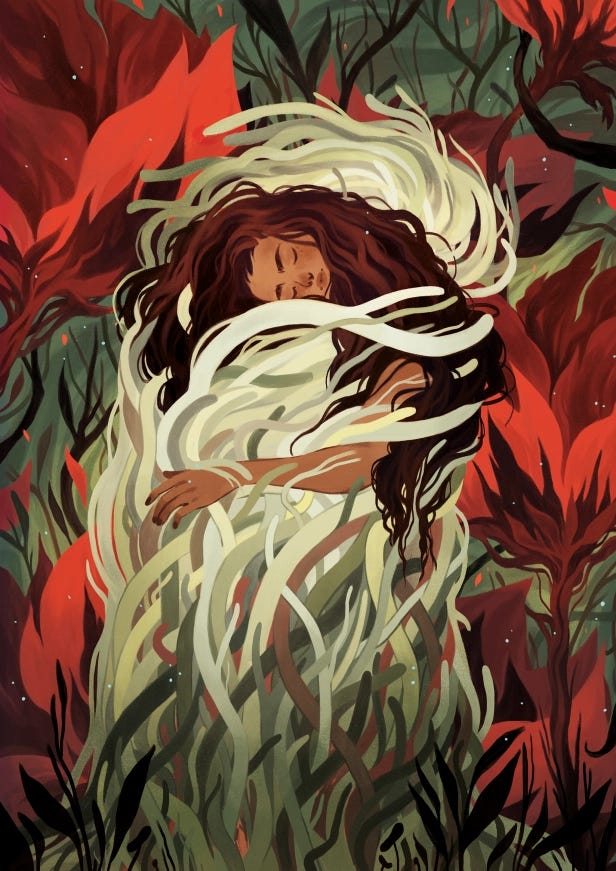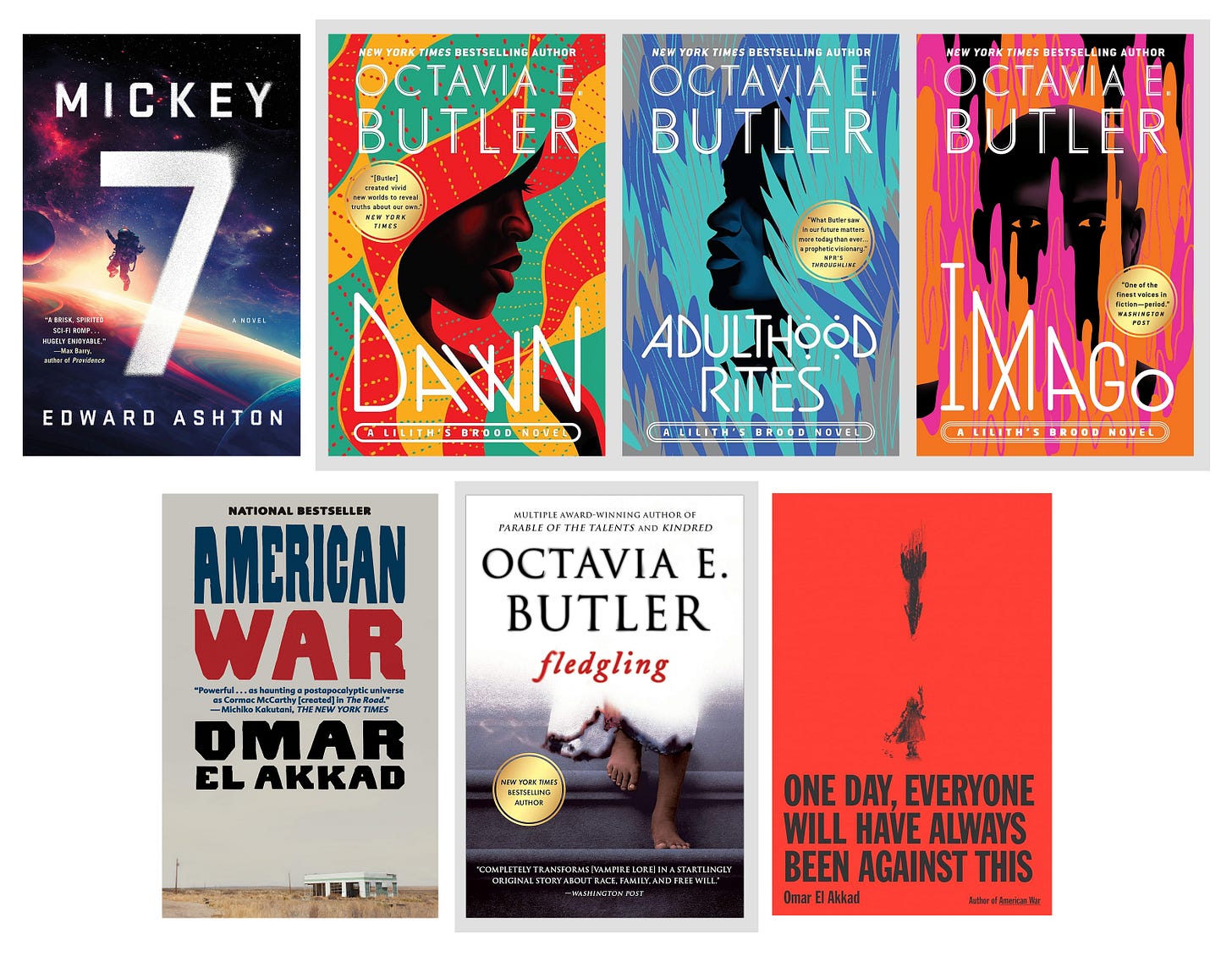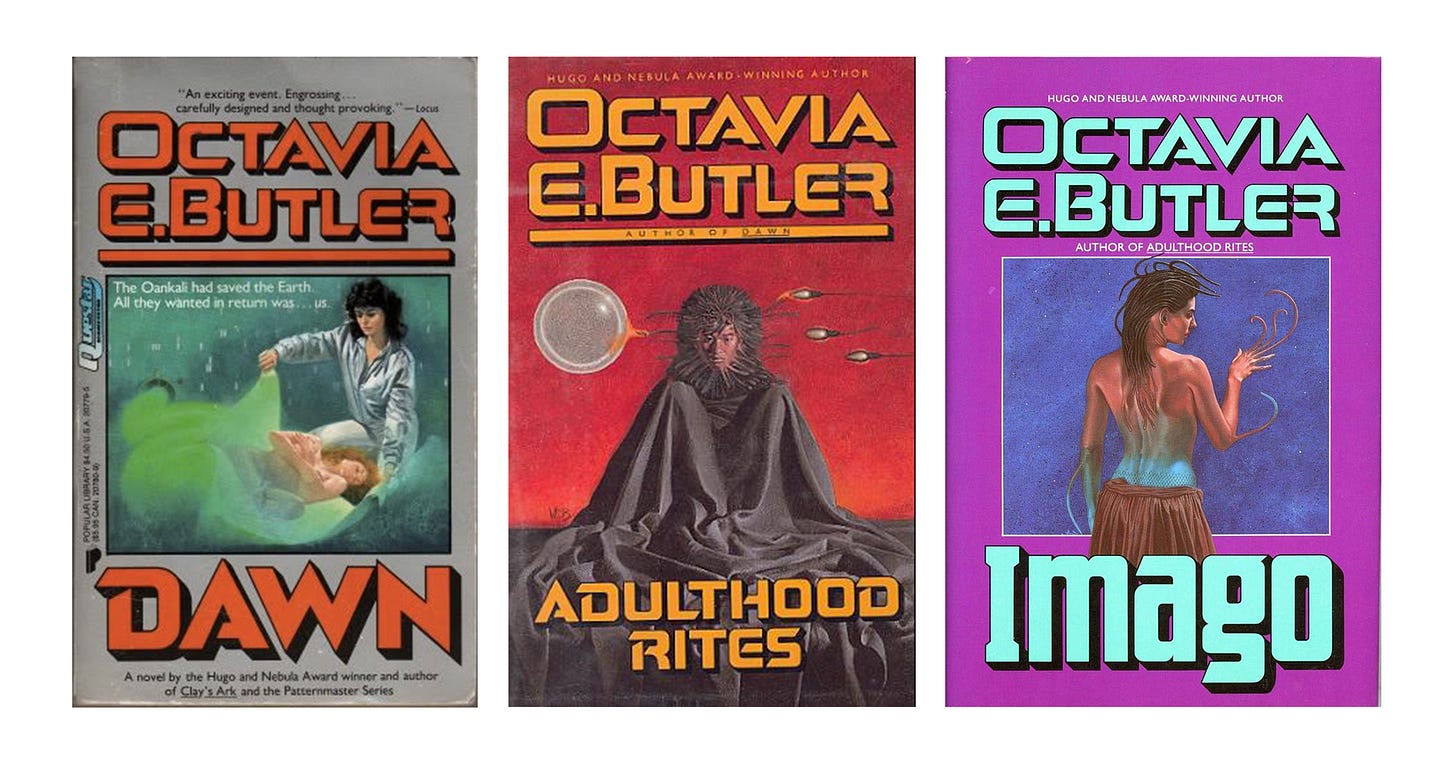What I Read, February 2025
More Butler (her best?), some vampires, a lot of aliens, plus an American Civil War (fiction) and American imperialism (non-fiction) by the same writer.
My reading plans were stymied about halfway through the month when I just hit a reading wall and allowed the wall to remain. I read a ton in the first six weeks of this year and I don’t mind taking a mental break that has allowed me to write more, and watch some TV (I’ve been rewatching RPDR and American Horror Story).
I’m going to keep my future plans softer to make space for the impulses I have.
Mickey7 - Edward Ashton
This is the basis of the new Bong Joon-ho movie Mickey17 starring Robert Pattinson, my most anticipated movie of the year (so far).
In humanity’s star-faring future, risky and fatal tasks are handled by “Expendables,” bottom-rung workers whose memories and personalities are saved and downloaded into bioprinted bodies to assume all risk on alien planets. At a new colony on an inhospitable planet, Mickey 7 is erroneously marked dead. But when he limps back to his bunk and finds Mickey 8 in his bed fresh from the printer. They cannot both be allowed to live, the aliens have started attacking the base, and Mickey’s girlfriend is starting to get suspicious about her lover’s disappearing wounds.
I liked this. It has great pacing and clear characters, fertile ground for adaptation.
It does have one major problem: it fails the Promise of the Premise. This is an idea from Blake Snyder’s Save The Cat, and I’m going to write an essay about it in the coming weeks so I’ll keep it short here: Mickey7 is called Mickey7 because the whole conceit of his character is that he dies and gets resurrected in protein print. He’s died six times when we meet him, and we do get to hear the stories of those deaths told in retrospect. We don’t get to see our Mickey die. The premise sets up the expectation that we will watch him die and printed out at least once, but our Mickey never does. Never rewarding that expectation made this fall short for me.
There is a sequel which I might try to squeeze in.
Xenogenesis Trilogy (Lilith’s Brood) - Octavia E. Butler
I’m reading all of Octavia E Butler this year (here’s why), and this trilogy really feels like Butler at the height of her power. Mini summaries before my take:
Dawn
Lilith wakes up on an alien ship after humanity has destroyed itself and the Earth in global war. The caterpillarlian, humanoid aliens task her with waking up the other humans they’ve saved and preparing them for a future of interbreeding on a resurrected Earth.
Adulthood Rites
Lilith’s human-alien hybrid son, Akin, is kidnapped on Earth by infertile humans resisting the aliens and compulsory interbreeding. As the first real hybrid he is the first to experience human and alien ways of life, making him the perfect steward for new ideas for the future.
Imago
As the end of the resurrected Earth draws nearer, and the hybridization between humans and aliens becomes more powerful, a new hybrid Jodahs discovers a hidden tribe of still fertile and violent humans who open his mind to consider new strategies for coexistence.

This trilogy is WILD.
Days before reading these books, I saw a Reddit thread asking for “the most alien aliens you’ve read”, and my reaction was obviously the Ariekei from China Miéville’s Embassytown (a MUST read), but I saw a Redditor had mentioned the Oankali, the aliens from Xenogenesis, and I think it’s well earned. These aliens breed themselves into different shapes, and the ones that we mostly interact with in the trilogy are humanoid, but they’re covered in tentacles and mostly don’t have human features (like hair, eyes, ears), but they’ve been bred look like they do so that they don’t freak humans out more than necessary. Their society’s bedrock is eugenics - it’s their entire evolutionary imperative and reason for existing. Ultimately they’re a fascinating, optimistic expression of Lovecraftian horror. Something truly groundbreaking by Butler.
A huge takeaway from this trilogy is Butler’s thesis as to why human beings will always self destruct. Butler says, through the mouths of the Oankali, that humans contain a fatal conflict: we are both intelligent and hierarchical. Our inherent hierarchical nature will always create conflict among ourselves, even in small groups, and our intelligence means that our capacity for destruction will always outpace our environment. In the books, the Oankali can breed this conflict out of us but it would require hybridization. There’s no possibility for pure humans to progress beyond this conflict, it’s too foundational to our DNA, and so, if given enough time, we’re an inherently suicidal species.
The profundity and simplicity of this idea has stitched itself onto my consciousness and it’s hard to ignore once it’s revealed.
There’s a ton to say about this trilogy, but what’s most important: if you like Butler, this is her at her most essential. A must-read for anyone who’s ready for it.
American War - Omar El Akkad
From the author of One Day, Everyone Will Have Always Been Against This, which is why I got it. I was so excited for One Day… that I looked El Akkad up and found this novel which imagines an American Civil War ~50 years from now. The description was so up my alley, I had to read it ASAP.1
This novel is a triumph. There’s so much to say about this book, it’s hard to distill. It is at once:
A deeply imaginative and brilliant projection of what America could look like in 50-70 years
An empathetic and illuminating examination of how American Imperialism in the Middle East has wrought anti-American violence
Blisteringly beautiful prose that takes its time to kidnap the reader into its reality
Brilliantly paced, exciting, thrilling, horrifying, consoling
This book is peak. It wears its inspirations on its sleeve (most notably The Grapes of Wrath), and features myriad inventions that will establish themselves in your memory as reality you haven’t witnessed quite yet.
Read this book.
Fledgling - Octavia E. Butler
A young vampire awakens injured, weakened, and without memory. As she pieces her history together she learns she’s the latest evolutionary step for an ancient species, and her existence has inspired a racist civil war.
According to some reporting I’ve read, Butler was blocked before writing Fledgling, and it was ultimately her final novel before her accidental death.
Her blockage is evident in this novel. It’s a great time. Like all Butler novels it’s inventive and her characters routinely surprise in their generosity and empathy, but it’s also very conventional for a Butler novel. Her riskier instincts seem to be quelled, and many plot elements feel more reflective than self-generated. Except for Kindred and Parable of the Sower, this is as easy to read as she gets. I suspect that in her blockage, she opted to shorten her reach and make the work more manageable.
I’m a little surprised this wasn’t a massive hit, but I suspect it would have been if she hadn’t died in 2006. Butler was a chronic serializer, and Fledgling leaves the door wide open for any number of following novels. There’s evidence that she had planned almost a dozen Parable books; I could see a near endless series of Fledgling books. Had she produced a few more, the series could have given Twilight a run for its money.
There’s was an order for a Fledgling pilot, and I hope it comes to fruition. The story is worthy of a rich screen adaptation.
One Day, Everyone Will Have Always Been Against This - Omar El Akkad
The discourse would have you believe that this is a book about Palestine, which it is, but it’s also a righteously rageful takedown of the myth of Western Imperialist superiority and an examination of how that myth is endlessly created and recreated. It is a series of 10 essays that explore the lies and enforcement and failures of those who live in, around, and for, the empire.
El Akkad’s rage is cast by his beautiful prose and signature restraint. Between this and American War, his mastery of language is undeniable.
In the very first essay, El Akkad tells a short story about rubbernecking a car accident in Qatar in the 1990s that in a single page explains the entire trajectory of American culture and politics of the last 15 years.
I find myself continuously at a loss for responding to El Akkad’s work. This man knows how to write. He says the most dangerous and courageous and admirable things in the most visceral and beautiful ways. Protect this man.
This book is essential reading by anyone who lives in America or its shadow. Non-negotiable.
TBR March 2025
Since I’m in the midst of a reading slump, I’m setting the bar at a low, passable level for the next month.
Unexpected Stories by Octavia E. Butler
Bloodchild and Other Stories by Octavia E. Butler
These are her two collections, the last books of Butler’s I have to read before rereading work I’ve already read.
Sunrise on the Reaping by Suzanne Collins.
A new Hunger Games novel! This one highlights Haymitch Abernathy’s games, the 50th games, 24 years before the events of the first The Hunger Games. Each Hunger Games novel has worked as biting criticism of contemporary events, so I’m excited to see Collins’ metabolizing of our current moment through the lens of Panem’s favorite pastime.
On a personal note, if I had read this book when it released I probably wouldn’t be writing the book I’m currently writing because it scratches many of the itches that necessitated my project. It’s diverged enough that we’re not walking the same path, but the genesis is similar.





